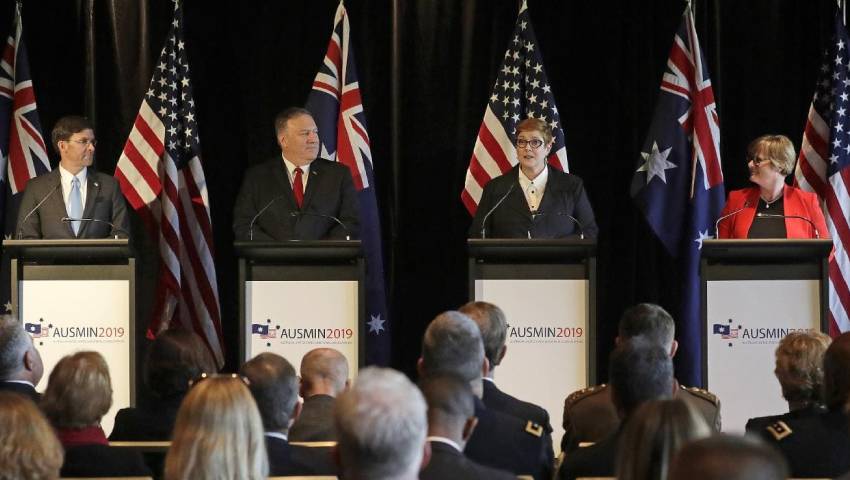With the world still grappling with the chaos and turmoil of COVID-19, as well as rising great power competition and assertiveness, particularly in the Indo-Pacific – foreign relations, multilateral partnerships and traditional diplomacy are more relevant than ever, and the latest round of AUSMIN is a powerful example of this, explains Chris Skinner.
To continue reading the rest of this article, please log in.
Create free account to get unlimited news articles and more!
The periodic meeting between defence and foreign affairs cabinet officers of the US and Australia is going ahead on 28 July in Washington, DC, in spite of the COVID-19 pandemic and the extraordinary logistical demands of face-to-face meetings in the is time of Zoom and other video conferencing now the new norm.
Writing in the Weekend AFR Ashley Townshend, director of foreign policy and defence at the United States Studies Centre at the University of Sydney, says that three principles should guide the talks:
- Firstly, the most urgency policy matter is helping our joint Indo-Pacific friends "to sustainably recover from the pandemic. With more than 600,000 COVID-19 cases in the region – coupled with deteriorating health, economic and development outlook … the scale of the crisis outstrips our current capacity to respond";
- Secondly, urgently strengthening the contribution by our (Australia-US) alliance "to deter aggression and coercive statecraft"; and
- Thirdly, the need to project our respective preferences for "how we want our Indo-Pacific strategies to evolve … for domestic and regional audiences".
Director Townshend does note some important differences in our public commentary on China, saying "Canberra seeks a less politicised approach and has publicly-supported engagement alongside a firming up of our China strategy".
As others have commented, Australia must work out how to trade with China while resisting all forms of unlawful coercion and interference. We will never accede to choosing between the US and China.
So, what then is behind the reductions in Australia’s diplomatic representation and hence ability to engage with all states and groups within the Indo-Pacific? Last week, Jonathan Pryke, director of the Pacific Islands Program at the Lowy Institute, wrote in the AFR, 'Latest round of DFAT cuts shows our foreign policy’s khaki tinge' (20 July 2020): "With Australia’s defence, Home Affairs, and intelligence budgets all skyrocketing while our diplomatic and development budgets hit all-time lows."
Meanwhile, US Secretary of State Mike Pompeo has declared unequivocally that China’s claims in the South China Sea are illegal, and ordered closed a Chinese consulate in Houston, Texas. So there would seem to be more that should be discussed next Tuesday beyond the three principles listed above.
Fundamentally we need credible defence capability as both deterrent and response to aggression as was well described in the recent Defence Strategic Update. But before we fall back on this defence we should be proactive in engagement in the region and working hard to forge multi-lateral alliances and agreements to resist the hegemonic advances of any world power with values and behaviours inimical to Australia’s own and to the collective adherence to international law and norms.
Closer to home we should be taking special note of how we can work best with Indonesia. Evan Laksmana, of the Centre for Strategic and International Studies Indonesia, wrote last week in the AFR, ‘Australia’s regional defence strategy is short when it comes to Indonesia' (21 July 2020): "The strategic update mentions Indonesia only once alongside Japan and India, whose defence relationships with Australia will be 'vital to regional security'."
Yet only two weeks ago the Indonesia Australia Comprehensive Economic Agreement (IA-CEPA) entered into force and Australia conducted an online public briefing of the enormous opportunity this presented for Australian health-tech, fintech and other ICT companies, as well as agricultural and manufacturing partnerships.
So some people in DFAT understand the importance of Indonesia collaboration. India does also in its approaches to Indonesia to collaborate more effectively in regional security and resistance to exploitation.
Also a topic for AUSMIN should be discussion of what we think is really happening in China and how we should respond. Professor Rory Medcalf made his views plain in his latest book, Contest for the Indo-Pacific: Why China Won’t Map the Future, and this view requires focused attention to how we prepare for a future where China meets increasing resistance though multilateral opposition that it has provoked. China will not lose its ambitions to achieve global preeminence but may well need to heed its own scholars to take a more indirect approach.
In that event, will Australia have invested well to boost defence and national security and scale back diplomatic and development aid to neighbouring countries? Conversely, are we responding correctly to China’s own change of direction?
Arvind Subramanian, writing in the AFR yesterday, ‘China has blown its historic opportunity’, portraying Chinese President Xi Jinping opening a new Chinese-built highway in Papua New Guinea.
All things considered then, the talks in Washington come at a critical point in Australia’s growing role in the Indo-Pacific region in which we must finally emerge from our cocoon of ‘Defend Australia’ to exercise the engagement and leadership that we are well able to do, provided only that we come to embrace such a role.
Chris Skinner served 30 years in the RAN at sea in SEATO deployment based in Singapore, the Vietnam War and surveillance in the north-west Indian Ocean. He is a councillor of the Australian Institute of International Affairs, NSW division.

 Login
Login







